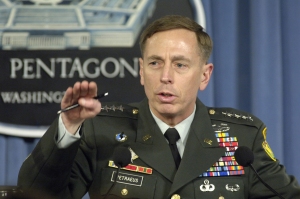“I’m not a pessimist, and I’m not an optimist. I am a realist”
Colorado Remembers 9/11 with General David H. Petraeus by Richard Hancock

David Petraeus speaks with moderator Andy Alexander at the Ellie Caulkins Opera House in Denver, on Sept. 11. Petraeus said Islamic State militants do not have strong local support in Iraq and their strength should not be over-rated. (Aaron Ontiveroz / AP)
September 11th, 2001 is a day that will always live in the minds of Americans. This year – on behalf of the Counterterrorism Education Learning Lab (CELL)- General David H. Petraeus was invited for a national security discussion. The discussion was moderated by former Washington Post Editor, Andy Alexander. Fortunately the CU Denver Political Science department was able to get their hands on a few press badges in order to get us on the inside. The ensuing discussion focused mainly on the Middle East North Africa (MENA) region and Russia/Ukraine. For the sake of my background I will focus on the MENA region.
The discussion was moderated by former Washington Post Editor, Andy Alexander. Fortunately the CU Denver Political Science department was able to get their hands on a few press badges in order to get us on the inside. The ensuing discussion focused mainly on the Middle East North Africa (MENA) region and Russia/Ukraine. For the sake of my background I will focus on the MENA region.
For those who aren’t familiar with the General’s background, General Petraeus served 37 years in the U.S. military, including commander of coalition forces in Iraq and Afghanistan, commander of the U.S. Central Command, as well as a 14 month stint as the Director of the CIA. The General has a freakishly sharp mind which was undoubtedly apparent in the discussion. Petraeus began by making the crowd erupt with laughter by indirectly eluding to an interest in going to a marijuana dispensary. Starting off strong, he claimed – as a result of the surge of Iraq in 2007, Iraq is better prepared for their future. This is a point he consistently reiterated, that Iraq today is in “better shape” today than it was in 2007.

U.S. Army Gen. David H. Petraeus, the commander of Multi-National Force – Iraq, briefs reporters at the Pentagon April 26, 2007, on his view of the military situation in Iraq.
Most people would find this shocking given the current situation of ISIL (the Islamic State in the Levant) in Iraq and Syria. Often the threat of ISIL towards the West is grossly exaggerated. Petraeus cleared this misconception by stating ISIL’s influence will not be widespread because the majority of the group members are not from Iraq or even the Levant region, therefore the group does not have deep regional roots. Many of the members of ISIL come from the Gulf region and other countries including the West. The Kurdish Peshmerga forces had been the strongest opponents of ISIL, until the U.S. recently began airstrikes. However Petraeus did state that the biggest challenge will be what happens after ISIL. Common sense should tell us that using brutality to respond to brutality only leads to more brutality. This is a troublesome reality because the U.S. feels in part responsible to “eradicate” ISIL because we and several other actors in the MENA region funded their creation, but at the same time the U.S. and its allies do not want another Iraq war. But where will the U.S. draw the red line to ensure we do NOT engage in another war in Iraq?
At the first National Security Council meeting in Iraq under the new Prime Minister Haider Al-Abadi, the main topics discussed were:
- to create an Iraqi national guard
- to urge Iraqi Sunni’s to oppose ISIL.
These two topics are in an effort to further develop the Iraqi military and their ability for self-defense without the use of Western troops. Other topics briefly discussed were the coalition of Arab states against ISIL and Iran’s role. The coalition of Arab states is crucial to addressing ISIL’s threat in the region because this move will increase self-determination for Arab states. This also greatly contrasts from the strategy of the Bush Iraq War. Iran is trying to increase its influence as threats increase along the Iraqi/Iranian border. Iran has already been funding Shia militias in an attempt to combat ISIL. Iran’s position is somewhat controversial as many have wondered why Iran didn’t act earlier on acting against the threat of ISIL.
Finally, Mr. Alexander brought up the topic of Syria. When asked whether the U.S. is creating an alliance with the Assad regime, Petraeus fired “the enemy of my enemy is more of an enemy.” Bashar’s regime will not be tolerated because it “is the magnet that attracts foreign Sunni militants.” Yes, for now the U.S. will work with the regime, however the main goals are to fight ISIL, Jabhat Al-Nusra (biggest Al-Qaida affiliate in Syria), and then afterwards Assad’s Hezbollah/Iranian funded army. Let us not forget Hezbollah is labeled a terrorist organization by the U.S. government.
Mr. Alexander asked Petraeus if he would ever run for president and whether or not the U.S. should have originally intervened in Iraq under Bush. Petraeus flatly rejected running for president because he values his family more. He then suavely stated that no one will ever know his true position on the Iraq War because it is not in his interest to make his colleagues look bad. Petraeus wrapped up the discussion by stating that he is extremely excited about the future of our country because he believes our generation is the new best generation. Despite his emphatic quote of being a realist, I left the discussion feeling quite optimistic.
